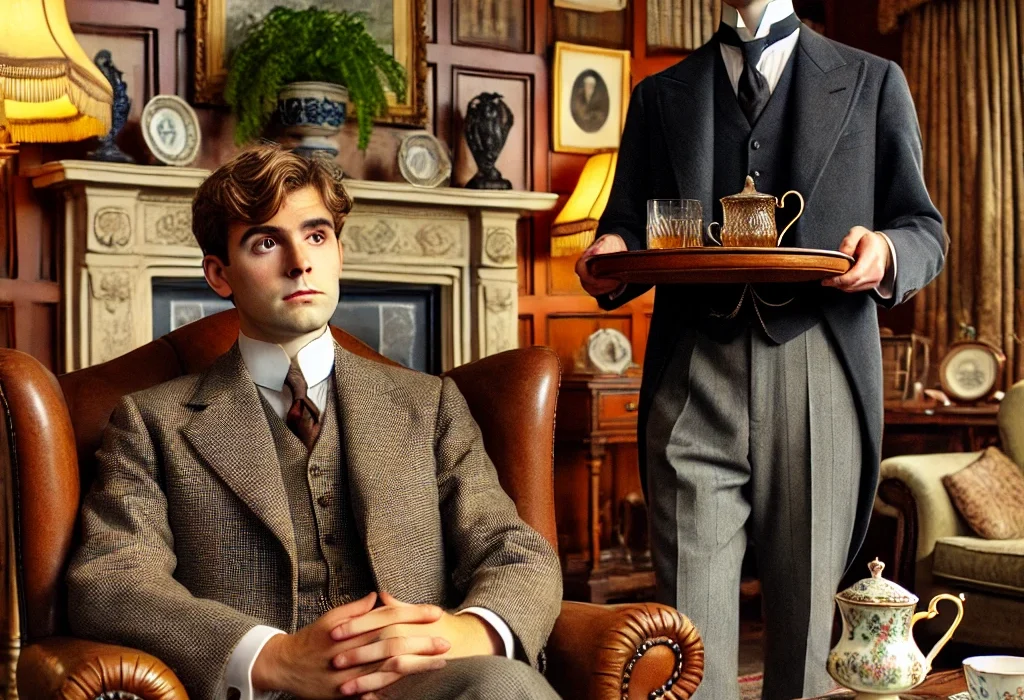“My Man Jeeves” is a collection of short stories by P.G. Wodehouse, published in 1919. Set in the early 20th century, it introduces readers to the delightful and humorous world of Bertie Wooster and his unflappable valet, Jeeves. The stories, filled with witty dialogue and comic situations, explore the dynamic between the bumbling Bertie and the resourceful Jeeves, showcasing Wodehouse’s mastery of humorous fiction.
Plot Summary
Bertie Wooster, a young man of leisure with a talent for finding himself in a pickle, always has his loyal valet, Jeeves, to bail him out. A man of infinite resource and sagacity, Jeeves has an answer for every predicament, no matter how convoluted. Bertie’s life, while enviable in its ease, often requires careful navigation, thanks to the whims of his friends and the demands of social decorum. But where Bertie stumbles, Jeeves glides effortlessly, transforming potential disasters into triumphs.
In one of their escapades, Bertie encounters his old friend, Bruce “Corky” Corcoran, a struggling artist. Corky’s main source of income is an allowance from his uncle, Alexander Worple, a man devoted to ornithology and writing books about American birds. Corky’s life is further complicated by his love affair with Muriel Singer, a chorus girl. He fears that his uncle, with his strict notions of propriety, would disapprove of his engagement. Corky turns to Bertie for help, knowing that if anyone can find a way around this sticky situation, it’s Jeeves.
Jeeves, ever the fountain of wisdom, devises a cunning plan. He suggests that Muriel write a children’s book about American birds, pandering to Worple’s passion for the subject. Jeeves’ idea is to flatter Worple by dedicating the book to him and including plenty of praise for his work. The plan works like a charm. Worple is so taken by the book and by Muriel’s seeming reverence for his work that he takes a keen interest in her, inviting her to dine and talk about birds. Corky’s spirits soar, believing he has Worple’s approval, only for fate to play a cruel trick. Worple, thoroughly smitten, decides to marry Muriel himself. Corky is left heartbroken, while Bertie is left to marvel at life’s peculiarities.
Corky’s distress is palpable, and once again, it falls to Jeeves to find a way out of this new mess. With an almost eerie calm, Jeeves proposes that Corky should channel his emotions into his art. Recognizing Corky’s talent for humor and caricature, he suggests creating a comic series about the trials of parenthood, using Muriel’s new baby as the central character. The plan not only provides Corky with a new source of income but also a creative outlet for his frustrations. The comic strip becomes an instant hit, turning Corky’s sorrow into unexpected success. What seemed like a devastating blow transforms into a career-making opportunity, all thanks to Jeeves’ unique perspective on the situation.
In another caper, Lady Malvern, a robust and formidable woman with a passion for social reform, arrives unannounced at Bertie’s apartment. She’s in town to research a book and plans to travel across America, leaving her son Wilmot, affectionately known as Motty, in Bertie’s care. Motty, on first impression, is a mild and subdued young man, giving Bertie hope that the arrangement will be a breeze. Little does he know, Motty has been kept on a tight leash all his life and now, with his mother out of sight, he is ready to taste freedom in all its forms.
As soon as Lady Malvern departs, Motty’s true nature emerges. He throws himself headlong into the nightlife of New York City, dragging Bertie along with him. Bertie, who values his quiet and orderly life, is soon overwhelmed by Motty’s energy and appetite for debauchery. Night after night, Motty carouses, turning Bertie’s apartment into a hub of wild parties and leaving Bertie at his wit’s end. The young man’s antics reach their peak when he ends up in jail for assaulting a policeman, leaving Bertie in a state of panic. With Lady Malvern due to return soon, Bertie is faced with the seemingly insurmountable task of explaining her son’s descent into lawlessness.
In the nick of time, Jeeves steps in. With his characteristic poise, he concocts a plan to explain Motty’s absence. When Lady Malvern arrives, Jeeves spins a tale that Motty has been busy visiting various New York institutions, furthering his education and broadening his horizons. He mentions that Motty’s itinerary included a brief stay in a “temporary establishment,” deftly implying that Motty was experiencing life in a broader sense without revealing the grim truth of his incarceration. Lady Malvern is none the wiser, taking Jeeves’ explanation at face value. Motty’s wild escapade is thus neatly brushed under the rug, thanks to Jeeves’ quick thinking.
Through these and other adventures, Bertie comes to rely on Jeeves not just for his problem-solving skills but for his guidance through life’s complexities. Whether it’s a matter of fashion, such as advising Bertie against an ill-advised check suit that would make him look like a music-hall comedian, or navigating the tricky waters of social engagements, Jeeves is always a step ahead. His quiet confidence and unerring judgment steer Bertie clear of trouble time and again.
Jeeves’ solutions are never straightforward, often involving a layer of subtlety and indirectness that bewilder Bertie but ultimately prove effective. His knack for manipulating situations and people without them realizing they’re being manipulated is nothing short of genius. Despite Bertie’s occasional desire to assert his independence and make his own decisions, he invariably finds himself drawn back to Jeeves’ impeccable wisdom. In Jeeves, Bertie recognizes not just a servant but a guide, a guardian angel of sorts, who always seems to have his best interests at heart.
Their dynamic is one of mutual respect, albeit one where Bertie’s deference to Jeeves grows with each passing predicament. Bertie knows he’s not the sharpest tool in the shed, but he’s clever enough to realize that having Jeeves by his side makes him a match for any challenge. Together, they navigate the absurdities and pitfalls of high society with a grace and humor that is unmatched, with Jeeves forever the unsung hero of their adventures.
Main Characters
- Bertie Wooster: The affable but often clueless protagonist, Bertie is a wealthy young man who frequently finds himself in tricky situations. His reliance on Jeeves showcases his good nature and lack of pretension.
- Jeeves: The quintessential valet, Jeeves is a paragon of intelligence, wit, and resourcefulness. His problem-solving abilities are the cornerstone of the stories, often pulling Bertie and his friends out of absurd predicaments.
- Bruce “Corky” Corcoran: A struggling artist and Bertie’s friend, Corky’s life is marked by his financial dependence on his uncle and his tumultuous love life. His interactions with Jeeves reveal his own comedic misfortunes.
- Wilmot “Motty”: The seemingly meek son of Lady Malvern, who turns into a wild party-goer once out of his mother’s watchful eye. His antics highlight the contrast between appearances and reality in Wodehouse’s world.
Theme
- Class and Social Structure: Wodehouse playfully explores the British class system, particularly the relationship between the gentry and their servants. Jeeves’ superior intellect contrasts with Bertie’s aristocratic background, subverting traditional class expectations.
- The Power of Wit: The stories celebrate wit and cleverness, especially through Jeeves’ character. His ability to navigate social complexities with ease and humor is a testament to the power of intellect over brute force or wealth.
- Comedy of Manners: Wodehouse delves into the absurdities of upper-class society, using humor to critique and celebrate the eccentricities of the English gentry. The misunderstandings and social faux pas provide a lighthearted look at human nature.
Writing Style and Tone
P.G. Wodehouse’s writing style in “My Man Jeeves” is marked by its light-heartedness and elegance. His use of language is both sophisticated and playful, with a strong emphasis on wit and humor. The narrative voice, particularly in Bertie’s first-person perspective, is conversational and engaging, filled with amusing observations and a gentle self-deprecation. Wodehouse’s dialogue is sharp and brisk, often leading to comedic misunderstandings and delightful exchanges.
The tone of the stories is humorous and whimsical, maintaining a sense of levity even in seemingly dire situations. Wodehouse’s ability to balance satire with affection for his characters creates a charming and enduring appeal, making the reader feel as though they are in on the joke with the author.
We hope this summary has sparked your interest and would appreciate you following Celsius 233 on social media:
There’s a treasure trove of other fascinating book summaries waiting for you. Check out our collection of stories that inspire, thrill, and provoke thought, just like this one by checking out the Book Shelf or the Library
Remember, while our summaries capture the essence, they can never replace the full experience of reading the book. If this summary intrigued you, consider diving into the complete story – buy the book and immerse yourself in the author’s original work.
If you want to request a book summary, click here.
When Saurabh is not working/watching football/reading books/traveling, you can reach him via Twitter/X, LinkedIn, or Threads
Restart reading!








